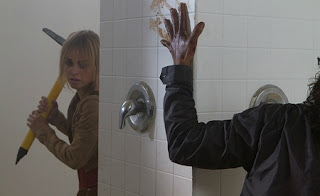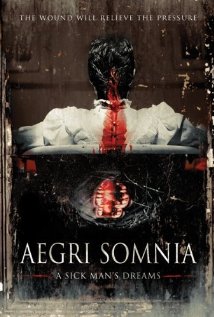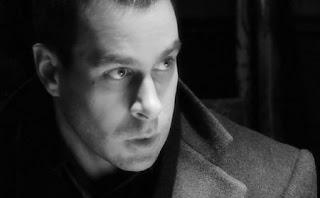Whether they mean/meant to or not, zombie movies have been aping George A. Romero since 1968. Perhaps you've heard of his first film. It was about a night in which the living were dead, and the dead were living. What he created all those years ago (after borrowing a bit from Richard Matheson's "I Am Legend") is now taken for granted as official and legendary zombie mythology, and assumed to be thousands of years old. Actually, it's roughly only forty, and comes not from a Native American shaman or cave wall drawings, but some old hippie stoner from Pittsburgh.
Zombies are slow. They are dead. Only a blow to the brain will kill them. If one bites you, you will turn into one. Don't call them zombies (even though they are).
Zombie Apocalypse (with a '2012' crammed in for its video release) is a SyFy Channel original movie and produced by The Asylum. Are you running for the hills yet? I don't blame you. But seriously, folks...it ain't half bad.
Ramona (Taryn Manning of "Sons of Anarchy") has hit the post-outbreak zombified streets with two of her friends, Kevin and and Billy. Zombies happen, as do bite wounds, but another group of survivors come along and save their bacon. Kevin is left as zombie chew toys, but Ramona and Billy are "adopted" by the survivors, led by Mack, and co-opted by Julian, a literary author quoter, Cassie, a woman hoping to become reunited with her husband and mourning the death (?) of her son, and Henry (Ving Rhames, in his third zombie movie appearance). Together they will do what everyone else who has survived the zombie outbreak so far does: try to keep surviving.

Honestly, Zombie Apocalypse is actually a decent little movie. The acting is competent, and magically, none of the actors ever come across as irritating. The characters aren't overflowing with development, as some receive a little more back story than others, but you will at least know a little about each person. You're definitely provided with enough to reciprocate a modicum of care, as I'll admit to being movie-concerned during a sequence in which two characters become isolated from the group and surrounded by the dead.
Speaking of the dead, I must absolutely give Z.A. credit for something which may sound trivial (and please correct me if I am wrong), but this is the first zombie film I've seen to not only contain both walking AND running zombies, but also provide an explanation as to why some walk and some run (the walkers have been dead longer; the runners are "fresher"). Even in Romero's films it's established that zombies are slow and shambly, but will occasionally and uncharacteristically rush at a victim with little regard for continuity.
The make-up effects are pretty effective, save for the few moments when patches of a zombie's skin are inadvertently captured and reveal no rot or marring of any kind. The kills are cool, and for once I can say I've seen new ways in which to off a zombie. That ice skate kill is as ridiculous as it is awesome.
The script is smart, and contains so many classic bits from the "what-if" conversations we've all shared with friends around a late-night diner booth. What if a zombie apocalypse were to happen? What weapons would you use? Would you drive, or hoof it? Would you use bikes? Flamethrowers? What about animals? Do you think they would turn? It honestly feels as if the film were conceived by genuine zombie enthusiasts, and not just by people who threw something together containing zombies since they are very much in the forefront of current entertainment.

But alas...because this is a SyFy Channel original...the usual nitpicks arise. I always give credit where credit is due in terms of scope and ambition, and the filmmakers were mostly able to pull off a post-apocalyptic setting with very little money, but much of the CGI utilized in the film is at best laughable. Scenes with zombified animals come off as especially cartoonish, but there is enough evident care behind the scenes to let this slide.
In some scenes there is very little regard to exposition continuity. Meaning, it's noticeable when a character clarifies that to kill a zombie you need to destroy the brain, but then zombies are later brought down with shots/slices to the stomach, anyway. And it's also noticeable when a character says, "If you shoot an arrow at a zombie, retrieve the arrow if you can safely do so," then shoots a zombie with an arrow and runs right by it, not stopping to retrieve said arrow, even though it could have been done safely.
There is some truly horrendous dialogue, ie, "Are there any humans in here?", which a character calls out not once but twice, and leads me to wonder: do zombies really need that clarification? If they're in an unseen room and eating some fingers, will they hear that this dude is demanding to see humans only, realize they aren't the requested demographic, and go back to eating? No, of course they won't. They want fresher fingers.
Plus, for a movie in which thousands of bullets are sent smashing through teems of ghoul faces, there isn't a single scene of anyone reloading. Just sayin'.
Curiously, certain events or allusiuons are placed throughout the film that suggest a resolution or explanation for them is right around the corner...but then no such explanation comes. There are several scenes in which characters declare the zombies are getting smarter, are learning, but this leads to no real pay off. And in a scene where it's explained that Cass' son is attacked by zombies but not definitely killed, there's an established fear that she may run into a zombified version of her son later down the road...which never happens.
I wonder why all that is. Were there hopes or plans for a Z.A. 2? Was this some kind of pilot for a television show (which is a highly dubious question)? If no to both, then why introduce these developments only for them never to pay off?
Still, I dug this movie quite a bit. It's not perfect, comes nowhere close, and isn't trying to be. And for the sake of clarification, let me state this: had this been a theatrically released movie with a multi-million dollar budget, I would have ripped it a new asshole. It wouldn't come anywhere close to a watchable rating. It would endeavor to smell the fart fumes wafting off a simple rating of "terrible." But this was not that heavy weight. This was made for SyFy, people. SYFY. Have you seen their films? Of course you have. Your brain will forever be infected with much of their output. As such, because of its lineage, Z.A. deserves a lot of credit. It wasn't just run-of-the-mill garbage.

Romero's films will always be looked at as cannon, and fledgling zombie filmmakers of the world have long made their peace with that. Every zombie movie that soon will be - one that contains flesh eating, brain destroying, and a contagious virus - will always and forever be a sequel to Romero's films, whether they like it or not. As it stands, Zombie Apocalypse happens to be one of the better ones.















